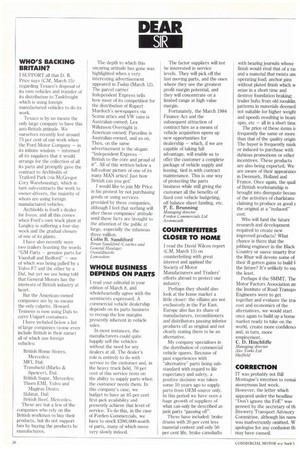WHOLE BUSINESS DEPENDS ON PARTS
Page 26

If you've noticed an error in this article please click here to report it so we can fix it.
I read your editorial in your edition of March 8, and wholeheartedly agree with the sentiments expressed. A commercial vehicle dealership depends on its parts business to recoup the low margins presently inherent in vehicle sales.
In most instances, the manufacturers could quite happily sell the vehicles without the need for any dealers at all. The dealer's role is entirely to do with service to the customer and, in the heavy truck field, 70 per cent of this service rests on the ability to supply parts when the customer needs them. In this company's case, we budget to have an 85 per cent first-pick availability and presently achieve that level of service. To do this, in the case of Forden Commercials, we have to stock £280,000-worth of parts, many of which move very slowly indeed. The factor suppliers will not be interested in service levels. They will pick off the fast moving parts, and the ones where they see the greatest profit margin potential, and they will concentrate on a limited range at high value margin.
Fortunately, the March 1984 Finance Act and the subsequent attraction of contract hire as a means of vehicle acquisition opens up new opportunities for dealership — which, if we are capable of taking full advantage, will enable us to offer the customer a complete package of vehicle supply and leasing, tied in with contract maintenance. This is one way of protecting the parts business while still giving the customer all the benefits of fixed cost vehicle budgeting, off balance sheet funding, etc. P. E. Brunning Managing director Forden Commercials Ltd Avonmouth


























































